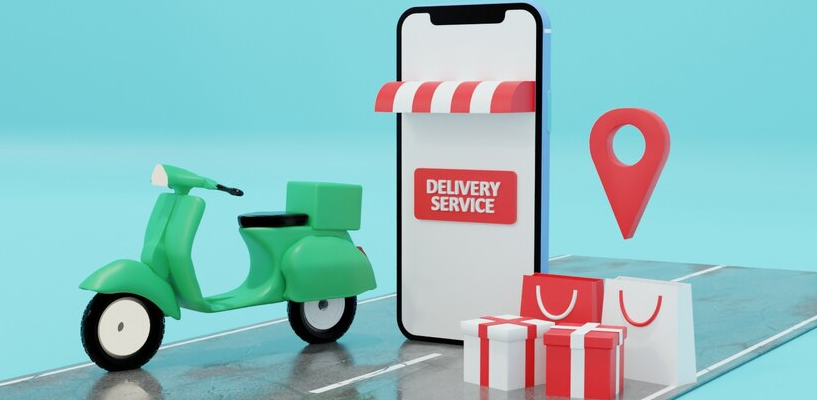How Much Does It Cost To Develop A Delivery App Like Rappi

In the digital era, delivery apps like Rappi have become synonymous with convenience. Whether it’s groceries, food, or any other commodity, the demand for delivery services is soaring. Understanding the cost factors of building a delivery app akin to Rappi is imperative for entrepreneurs looking to venture into this lucrative sector.
Developing an app like Rappi costs around USD 8K to 12K. However, certain factors affect the development cost. This comprehensive guide aims to illustrate costs, providing detailed insights to create informed decisions.
Want a Rappi-like app and earn more? Contact Hyperlocal Cloud now!
Increasing Popularity of App-like Rappi
On-demand delivery apps raise funding and fame because of the present market conditions. Below are the prominent factors that led to the rise of on-demand delivery apps-
- Increasing migration
- Transport infrastructure
- Mobile app technology
- Wealth Inequality
- Population density
How Does Rappi Make Money?
Customers look for ease. When they find everything under one portal, they are on cloud nine. Thanks to Rappi for making it possible. The app allows users to order food, groceries, or drug store medications, withdraw money using an ATM, and transfer money.
The app makes value for all players in the ecosystem by using an innovative business model.
Rappi generates money by charging merchants commissions on each order. It has built a secondary revenue stream by partnering with consumer-packaged-goods (CPG) companies. The app charges CPG companies’ marketing fees to guide customers to their display ads and products.
CPGs can leverage Rappi’s consumer data to choose customer profiles to send product samples. Rappi Pay is another value-added service. It is an electronic payment system through which users can transfer money and make payments to merchants with their phones.
Also, Rappi charges users a fee for each delivery or service provided. It encourages data monetization and sells required data for market research and analytics.
Are You Planning To Build An App Like Rappi?
Understand the Rappi Business Model
Rappi’s business model blends several services offered by multiple apps in different countries. Have a look-
Grocery Delivery:
Rappi, when launched with grocery shopping, is available on the app at its core functionality with a few supermarkets. The company expanded into other areas and struck partnerships with major players in the retail market. Carulla and Exito are two of Columbia’s available on the app.
Food Delivery:
Food Delivery was also part of Rappi’s initial launch, which helped the company lead the competitive crowd. The app provides added value to its users by offering services on a single app.
Mobile Money Transfers:
Rappi Pay, the payment service of Rappi’s payment service, permits customers to transfer money from their accounts to other users through credits or credit cards on the app’s digital wallet. RappiPay is easy to use and does not charge any transaction fees.
Errands:
Users can request services such as package delivery, food ordering, product exchange, and even finding players for gaming sessions. This broad range of services saves users time and effort by outsourcing errands to Rappi’s efficient couriers and service providers network.
Micro-mobility:
Rappi’s collaboration with Grin enhances its service portfolio by integrating micro-mobility options. Through the app, users can easily rent scooters provided by Grin, enabling them to navigate cities efficiently. This partnership benefits users by offering convenient transportation solutions and supports Grin’s expansion across Latin America, demonstrating Rappi’s role as a platform for fostering innovative mobility solutions.
Rappi employs over 50,000 delivery workers. The couriers can work on the app as long as they wish and get paid per order. Couriers are self-employed and generate money through delivery tips and fees.
Key Features of a Delivery App Like Rappi
Recognizing the core features of delivery apps like Rappi that form a similar delivery app is essential to gauge the development cost. These features are the app’s backbone and influence the development cost.
Registration and User Profiles:
Users can register using social media or email accounts and create profiles. Their profiles include order history, store preferences, and payment methods for a personalized experience.
Search and Filters:
Executing a rigid search functionality with filters for price ranges, ratings, and more helps users find what they want.
Order Placement and Tracking:
The app allows users to place orders effortlessly and track their progress in real-time, from preparation to delivery.
Payment Gateway Integration:
Diverse and secure payment options, such as digital wallets, cash on delivery, and debit/credit cards, are fundamental.
Reviews and Ratings:
The app enables users to rate and review products and services, enhancing quality and trust.
Push Notifications:
Sending timely notifications about order status, offers, and other relevant information keeps users engaged.
Tech Stack Used to Develop Apps Like Rappi
The tech stack should be rigid enough to function and manage different functions seamlessly and support multiple functionalities.
Application and Data: React, Javascript, MongoDB, Amazon DynamoDB, Node.JS, Typescript, Java, Redis, PostgreSQL, Spring Boot, Firebase, Kafka, Android SDK, Amazon RDS, Scala, Kotlin, Amazon SQS, Swift, and Go.
DevOps: Docker, Git, Kubernetes, Visual Studio Code, Bitbucket, Xcode, Grafana, Gradle, and Android Studio.
Business Tools: Slack and Jira
Utilities: Elasticsearch
Discuss the Feasibility of Your Business Idea with Experts
7 Factors Affecting the Development Cost of Apps like Rappi
Developing a similar app might take little effort, but it requires developing a new business. Thus, the cost varies due to numerous factors.
Product Requirement:
The development concept behind Rappi is fulfilling customers’ needs in every aspect, from grocery delivery to playing games. Thus, your app requirement says a lot about your investment. Cost varies with the platform compatibility if you want an app for multiple platforms, such as Android, iOS, and more. It also depends on the security level you need to handle sensitive user data.
Design and Functionality:
Both factors impact the cost of developing a mobile app. The app design enhances the user experience for that app. For instance, Rappi has an intuitive and sleek design with engaging functionality such as progress tracking, social sharing, and personalized workout plans. The app cost relies on the complex functionality and hardware integration.
Application UI/UX:
This factor is an essential factor significantly affecting the cost of building a mobile app. UI/UX refers to how the app looks and affects the cost of app development, which includes user testing and iterative design. Building an app like Rappi needs additional time and resources and determines what works best for the new app and its users.
Features and Application Maintenance:
These crucial factors impact the cost of developing an app like Rappi. Its features refer to the app’s functionality to its users. Features and application maintenance can impact the cost of developing a mobile app, including feature complexity and API integration. It relies on different features you want to add to your Rappi-like app.
Location of the Developers:
The development cost depends on the location of app developers. The development company’s location matters a lot in deciding costs, including labor costs in different regions and infrastructure costs, such as electricity, office space, and internet connectivity.
Tools, Languages, and Technology:
Different tools are available for app development, like Rappi, ranging from free and open-source tools to expensive commercial ones. Selecting the right development tools for the project can impact the overall development cost. Also, programming languages play a crucial role in affecting the development cost. It depends on which language the app needs. For instance, Kotlin or Rust may need more specialized knowledge and skills, impacting the development costs.
Testing and Quality Assurance:
Thorough testing is essential for recognizing and rectifying issues and bugs. QA processes, which test distinct platforms and devices, contribute to a flawless user experience. Providing sufficient testing resources helps prevent post-launch problems and higher costs.
Development Cost Estimation of Rappi-like App
Building an app can be lucrative and require some upfront costs. The developers at Hyperlocal Cloud can help you create a similar app using clone scripts. Knowing the development cost is imperative. As mentioned, developing an app like Rappi costs around USD 8K to 12K.
The more feature-filled and complex your app is, the more expensive it will be to develop. It is a good idea to confine the budget and timeline of the project before committing to it as you begin planning the app development. Doing this helps you make better financial decisions and meet your goals.
Developers at Hyperlocal Cloud are proficient in developing Rappi-like apps with top-notch features that make your app stand out from the market.
Hidden Application Development Costs
Hidden Application Development Costs refer to costs that may take time to develop an application. These costs, if overlooked or underestimated, can significantly impact the overall development costs of an application. Examples of hidden application development costs are:
Back-end Infrastructure:
Building an application requires more than building a user interface. A solid background infrastructure is necessary for the application’s smooth and efficient operation. Its maintenance may include server hosting, database management, and other related costs.
Integration with Third-party Services:
Many applications need third-party integrations, such as social media, payment gateways, or APIs. Integrating these services may incur additional costs, such as licensing or API usage fees.
App Store Fees:
If you intend to distribute your app through applications like Google Play or Apple’s App Store, you must pay a fee to these platforms. These fees may include application submission, updates, and hosting fees.
Maintenance and Updates:
After launch, the app requires continuous maintenance and updates to keep it running smoothly and to fix bugs or issues. Maintenance can include tech support time, server costs, and other related costs.
It’s important to consider these hidden development costs when budgeting for your app development project to ensure a comprehensive understanding of the total cost of your application.
Want to Get The Estimated Development Cost Of Your Delivery App Like Rappi
Wrapping Up!
The cost of creating a mobile application relies on multiple factors. However, you must hire expert Rappi-like app developers who help you get started with app development that fits your budget. Such an approach would help you analyze the requirements that suit your business’s needs without overspending.
Business owners and entrepreneurs add more features than required, increasing development costs.
Get ready for a tech-driven Rappi-like app! Hyperlocal Cloud is an on demand app development company that helps you control your development expenses while delivering high-quality mobile applications.





